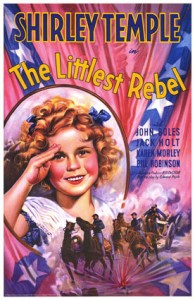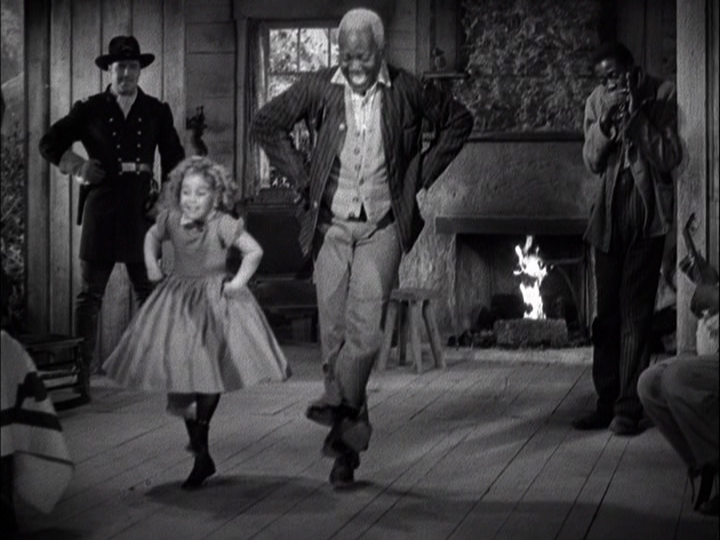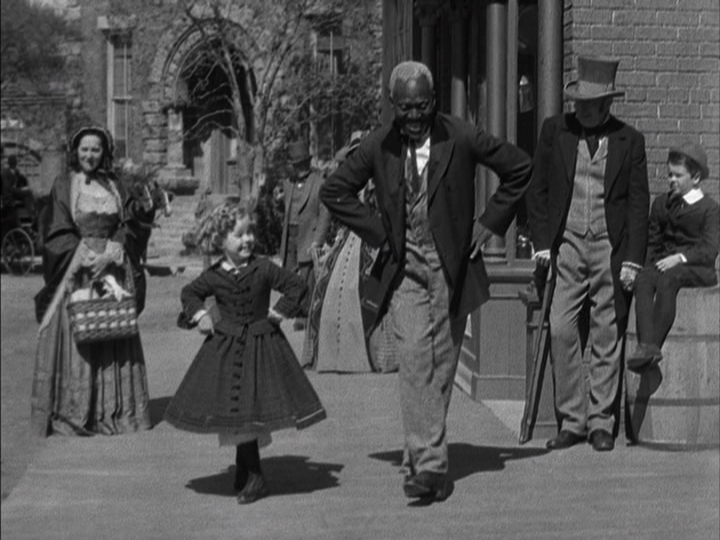|

Synopsis:
When a Confederate officer (John Boles) sneaks back to his plantation to visit his daughter (Shirley Temple) and dying wife (Karen Morley), he’s arrested by a Yankee colonel (John Holt), who — thanks to Temple’s charm — takes pity on him and helps him try to escape.
|
|
Genres, Themes, Actors, and Directors:
- Civil War
- Fugitives
- Historical Drama
- Karen Morley Films
- Plantations
- Shirley Temple Films
Response to Peary’s Review:
Peary accurately notes that Depression-era child star Shirley Temple is “in peak form as a charming little Southern girl” in this “enjoyable film” (directed by David Butler), “with the very self-assured, likable Temple displaying amazing acting and dancing talents”. He points out that “her cheerful tap routines with [Bill ‘Bojangles’] Robinson” — a.k.a. “Uncle Billy” — are “classics”, and that Temple’s “love and respect for her black ‘uncle’ are touching”. He acknowledges, however, that it would be “hard to accept” that the slaves on Temple’s plantation “seem so happy” if “Boles and Morley weren’t so nice”; indeed, modern viewers will likely be greatly disturbed by the film’s decidedly patronizing attitude towards slavery, one which portrays loyal Robinson as an endless source of avuncular kindness rather than someone who might be interested in escaping to his freedom. Regardless, The Littlest Rebel remains a classic Temple vehicle, not least because of the undeniable chemistry she and Robinson possess together; it thus earns my vote as the movie film fanatics should consider watching if they want to get a taste of what Temple’s phenomenal fame was all about. Watch for the “delightful” (if utterly unrealistic) “scene in which Temple asks President Lincoln (Frank McGlynn, Sr., in a fine bit)” for a special favor.
Redeeming Qualities and Moments:
- Shirley Temple as Virgie

- Temple and Robinson’s magnificent dancing sequences


Must See?
Yes, as a representative Temple flick, and to see Robinson at his dancing finest.
Categories
Links:
|




One thought on “Littlest Rebel, The (1935)”
With much reservation, a once-must for its place in cinema history.
I’m willing to concede that “film fanatics should consider watching [this] if they want to get a taste of what Temple’s phenomenal fame was all about.” But it’s still drippy stuff, ultimately not all that satisfying a watch.
Like the Elvis Presley films, Temple’s flicks (esp.) from her one-note, ‘cutesy’ period were standard television fodder when I was a kid. Being a film fanatic from my wee years, I did watch them…without particularly enjoying them much. More or less, if you’ve seen one, you’ve seen them all. Of course, Temple’s work is not unique in that regard – the same could be said overall of others in early film history, like Laurel and Hardy or Hope/Crosby in their road pictures: certain cash cow franchises had an “If it ain’t broke, don’t fix it.” policy.
Because other Temple films are listed by Peary, I will get around to revisiting them – but I’ll admit I’m not thrilled about doing so. The films were immensely popular in their time – but I think even the weaker Presley films are more interesting. In ‘The Littlest Rebel’, for example, when the best you can say about it is that the two dance sequences are quite fun (and they are), that’s hardly a recommendation.